- Home
- Don DeLillo
The Names Page 22
The Names Read online
Page 22
“A man will say, if you ask him how many children he has, two, proudly. Then you learn he has a daughter he didn’t bother to count. Only the sons count. That’s the Mani.”
“I wonder if I’ll ever see my apartment again,” Del said. “I’ve been trying to reconstruct it in my mind. There are large gaps. It’s like parts of my life have melted away.”
“Death and revenge,” Frank said. “A lot of the killing revolved around the family. The house was also the fortress. That’s the reason for these towers. Endless vendettas. The family is the safekeeper of revenge. They keep the idea warm. They nurture it, they promote the conditions. It’s like those family sagas of crime in the movies. People respond to Italian gangster sagas not just for the crime and violence but for the sense of family. Italians have made the family an extremist group. The family is the instrument of revenge. Revenge is a desire that almost never becomes an act. It’s a thing most of us are limited to enjoying in the contemplation alone. To see these families, these crime families, many of them blood relatives, to see them enact their revenge is an uplifting experience, it’s practically a religious experience. The Manson family was America’s morbid attempt to make a stronger instinctive unit, literally a blood-related unit. But they forgot something. The revenge motive. They had nothing to revenge. If there’s going to be blood, it has to be a return for some injury, some death. Otherwise the violent act is ghastly and sick, which is exactly the way we see the Manson murders.”
“Frank’s people come from Tuscany. I tell him why do you talk like a Sicilian.”
“Look at her. I love that face. That dull empty perfect face. How right for today.”
“Suck a rock.”
“Self-created,” he said. “It’s a blankness she wills out of her deepest being. Vapid. Does vapid say it? Maybe vapid says too much.”
“If Manson is ghastly and sick,” I said, “what do we have here, with our own cult?”
“Totally different. Different in every respect. These people are monks, they’re secular monks. They want to vault into eternity.”
“The same but different.”
“Film is not part of the real world. This is why people will have sex on film, commit suicide on film, die of some wasting disease on film, commit murder on film. They’re adding material to the public dream. There’s a sense in which film is independent of the filmmaker, independent of the people who appear. There’s a clear separation. This is what I want to explore.”
It was a long dark room. A boy kept bringing pots of tea, ouzo for Frank. Del was watching an old man sitting in a corner, a cigarette hanging from the middle of his face.
“Film,” she said absently. “Film, film. Like insects making a noise. Film, film, film. Over and over. Rubbing their front wings together. Film, film. A summer day in the meadow, the sky’s full of heat and glare. Film, film, film, film.”
It was only when she’d finished talking that she turned her attention to Frank, grabbing a handful of hair at the back of his neck and twisting his head so that he might see directly into her gray eyes. Their public affection was reserved for the times when they heckled and mocked each other. It was an automatic balance, the hands and eyes as the truth-tellers of love, the things that redeem what we say.
We went to a restaurant two doors down. There was a handful of red mullet in a basket out front. We were starting to eat when the old man hobbled in, worn down to an argument with himself, a cigarette still drooping from his mouth. This made Del happy. She decided she didn’t want to talk to us anymore. She wanted to talk to him.
We watched her at his table, gesturing elaborately as she spoke, pronouncing words carefully, words in English, a few in Italian and Spanish. Frank seemed to be looking right through her to some interesting object fixed to the wall.
“She’s not part of anything,” he said. “She doesn’t know yet whether she wants to grow up and assume responsibilities in the world. She had a miserable time most of her life. She has a tendency to give in to fate or other people. But we tell each other everything. There’s an easiness between us. I’ve never known a woman I could be so intimate with. It’s our gift as a couple. Intimacy. I sometimes feel we’ve known each other three lifetimes. I tell her everything.”
“You told Kathryn everything.”
“She never told me anything back.”
“You told Kathryn more than I told her. It was a kind of challenge, wasn’t it? That was the mechanism between you two. You dared her to be part of something totally unfamiliar. You wanted to shock her, mystify her. She found this interesting, I think. Something her background hadn’t encompassed.”
“Kathryn was equal to any challenge I could come up with. Not that I know what you mean by dares and challenges.”
“Remember the shirt? She still has it. Your carabiniere shirt.”
“She looked good in that shirt.”
“She still does. It still bothers me, how good she looks in that shirt.”
“Finish your wine. This is the stupidest talk I’ve had in ten years.”
Del, the waiter and the old man were talking. The waiter was balancing an ashtray on the back of each hand.
“She’s beautiful. Del is.”
“Christ, yes, I do love her face. Despite what I say. It never changes. It’s eerie, how it never changes, no matter how tired she is, how sick, whatever.”
We sat in the hotel lobby, in almost total dark, talking. When Frank and Del went upstairs I walked through the streets above the waterfront. A strong wind came up, different from wind in an open space. It went banging through town, disturbing the surface of things, agitating, taking things with it, exposing things as temporary, subject to a sudden unreason. There were wooden balconies, chicken coops. The walls were crumbling in places and cactus grew everywhere. Figures in the light, in small rooms, wall shadows, faces.
They want to vault into eternity.
I would conceal myself in Volterra’s obsession as I had in Owen’s unprotected pain, his songs of helplessness.
9
I made my way through the mud streets, the same complicated solitude. I could almost see myself, glowing in borrowed light. A voice, my own but outside me, speaking something other than words, commented somehow on the action.
I was made of denim and sheepskin. My shoes were waterproof, my gloves lined with wool.
This is the way things happen. I walk into a café in a wind-beaten town and they are right there even if I don’t know it at the time. And now I duck under a stone beam on a cold smoky morning in the towered hamlet where no one (almost no one) lives and he is sitting on a blue crate, a crate for soda bottles, and there is one for me as well, upended. A fire is going, twigs mostly, and he lifts his feet off the dirt floor, putting them close to the flames, and it is nothing, a talk in a basement room with a medium-sized man who has a cold. But how else would it be? What did I expect? The only true surprise is that I am in the scene. It ought to be someone else sitting here, a man who has seen himself plain.
“What do we have?” he said. “First we have a film director and now we have a writer. This is not so strange really.”
“Frank thinks I want to write about him.”
“About him or about us?”
“I’m a friend of Owen Brademas. That’s all. I know Owen. We’ve talked many times.”
“A man who knows languages. A calm man, very humane, I think. He has a wide and tolerant understanding, a capacity for civilized thought. He is not hurried, he is not grasping for satisactions. This is what it means to know languages?”
He had a long face, a receding hairline, pale freckles high on his forehead. Small hands. This reassured me in some mysterious way, the size of his hands. His face was impassive. He wore a black tunic unraveling at the right shoulder. I studied, I took mental notes.
“I thought you would want to speak Greek,” I said. “Or whatever the language of a particular place.”
“We are no longer in a place. We are a little
disorganized. Soon t will be all right again. Also this business with Frank Volterra is unique. What do we have? A situation we have not had before. So we are attempting to adjust.”
“Are the others interested? Will they agree to be part of a film?”
“There are problems. It is a question of our larger purpose. We must consider many things. One thing is whether we are such filmic material as Frank Volterra believes. Maybe we are not. He lacks a complete understanding?
“Owen Brademas had this understanding?”
“Have you?” he said.
“If we are talking about a solvable thing, a riddle or puzzle, then I have solved it, yes.”
“What is your solution?”
“The letters match,” I said. “Name, place-name.”
He was leaning back, balanced, hands clasped on his knees, his feet still dangling over the flames. I crouched forward, wanting to feel the heat on my face. He didn’t change expression, although it’s possible to say that my remark, my reply, prompted him to renew his stoic mien, to inhabit it more fully. I’d made him aware of the look on his face.
“Do we seem improbable to you?”
“No,” I said.
“I wonder why this is.”
“I don’t know.”
“We ought to seem improbable. What do you think?”
“I’m not sure. I don’t know.”
“Something in our method finds a home in your unconscious mind. A recognition. This curious recognition is not subject to conscious scrutiny. Our program evokes something that you seem to understand and find familiar, something you cannot analyze. We are working at a preverbal level, although we use words, of course, we use them all the time. This is a mystery.”
His eyes were dim, blood-flecked. He had a two-day stubble, reddish blond, darker than the hair on his head. His fingernails were yellowish and thick.
“In one sense we barely exist,” he said. “It is a difficult life. There are many setbacks. The cells lose touch with each other. Differences arise of theory and of practice. For months nothing happens. We lose purpose, get sick. Some have died, some have wandered off. Who are we, what are we doing here? There is not even a threat of the police to give us a criminal identity. No one knows we exist. No one is looking for us.”
He stopped briefly in order to cough.
“But in another sense we have a permanent bond. How could it be otherwise? We have in common that first experience, among others, that experience of recognition, of knowing this program reaches something in us, of knowing we all wanted at once to be part of it. When I first heard of this, before I became a member, it was in Tabriz, eight years ago. People in a hotel talked of a cult murder somewhere in the area. Much later, I cannot tell you how, I learned what the elements were. Immediately it reached me, something about the nature of the final act. It seemed right to me. Extreme, insane, whatever you wish to call it in words. Numbers behave, words do not. I knew it was right. Inevitable and perfect and right.”
“But why?”
“The letters matched.”
“But to kill?”
“Nothing less,” he said. “It had to be that. I knew at once it was right. I cannot describe how fully and deeply it reached me. Not as an answer, not as a question. Something else totally. Some terrible and definitive thing. I knew it was right. It had to be. Shatter his skull, kill him, smash his brains.”
“Because the letters matched.”
“I believe you see it, how nothing else would suffice. It had to be this one thing, done with our hands, in direct contact. Nothing else, nothing less. You do see that it’s correct. You see the rightness of it. You know it intuitively. The whole program leads up so this. Only a death.”
He put his feet on the ground in order to cough, head down, hands covering his face. When he was finished he leaned back again, balancing, his feet in the air once more. I reached to the side for more twigs, dropped them on the {ire. We sat that way in silence for a while. Andahl leaning well back, his feet raised. Axton crouched forward, looking into the fire.
“We walked through these mountains from north to south. When we came into the Mani we knew we would stay. We are set back but only for a time. What is here. This is the strength of the Mani. It does not suggest things to us. No gods, no history. The rest of the Peloponnese is full of associations. The Deep Mani, no. Only what is here. The rocks, the towers. A dead silence. A place where it is possible for men to stop making history. We are inventing a way out.”
He lowered himself again, coughed into his armpit. He was wearing a strange pair of suede boots trimmed on the outside with some fleecy synthetic—women’s boots, I thought. His pants were loose and brown, drawn in at the ankles.
“The large stone outside this village,” I said. “Why were those words painted there?”
“Someone, leaving, painted the words.”
“When you found them, you painted them over, made them illegible.”
“We are not painters. It was not a good painting.”
“Why did he do it?”
“There are many setbacks. We lose purpose, get sick. Some people die, some wander off. There are differences in meaning, differences in words. But know this. Madness has a structure. We might say madness is all structure. We might say structure is inherent in madness. There is not the one without the other.”
He coughed into his armpit.
“No one has to stay. There are no chains or gates. More die than leave. We are here to carry out the pattern. A small patient task. You have the word in English. Abecedarian. This is what we are.”
“I don’t know the word.”
“Learners of the alphabet. Beginners.”
“And how did you begin, how did the cult begin?”
“This can wait for another time. We will talk again if the occasion permits.”
Through the rest of the conversation I found myself eliminating contractions from my speech. Not to ridicule or mimic Andahl. It was something of a surrender to the dominance these complete words seemed to possess, their stronger formulation, spoken aloud.
“Does the cult have a name?”
“Yes.”
“Can you tell me what it is?”
“No, impossible. Nameforms are an important element in our program, as you know. What do we have? Names, letters, sounds, derivations, transliterations. We approach nameforms warily. Such secret power. When the name is itself secret, the power and influence are magnified. A secret name is a way of escaping the world. It is an opening into the self.”
From somewhere under his tunic he took a maroon scarf and wrapped it around his head. I took this to mean we were coming to an end.
“What we have not talked about is the experience of killing,” he said. “How it confirms the early sense of recognition, the perception that the program must end this way. It confirms everything. It tells us how deep we are in.” He was watching me through this. “We have not talked about the sound, the hammers, a damp noise, the way she crumpled, how soft it was. We have not talked about the way she crumpled or how we kept hitting, Emmerich sobbing, the word-building German, he could only groan and sob. Or how long it took, we have not talked about this. Or how we hit harder because we could not stand the sound, the damp sound of the hammers on her face and head. How Emmerich used the cleft end of the hammerhead. Anything to change the sound. He gouged, you know? We were hysterical. It was a frenzy but not of blood. A frenzy of knowing, of terrible confirmation. Yes, we are here, we are actually killing, we are doing it. It was beyond any horror but this was precisely what we had always seen and known. We had our proof. How right we were to tremble when we first learned the program. We have not talked about the way she crumpled or how we knelt over her, having found her weeks before, having determined her condition, having tracked her, having waited in the dust, in the silences, the burning sun, watching her drag her leg, watching her approach the place, the name, the place, all this, having matched the Greek letters, or how she crumpled, on
ly stunned at first, a single blow, or how we knelt over her with the hammers, smashing, beating in her head, or how he gouged with the cleft end, pulling out brains, or the sight of it. We have not talked about the sight of it, how flesh gives up its bloom and vigor, how functions gradually cease, how we could seem to ourselves to be causing functions to end, one after the other, metabolism, response to stimuli, actually sensing these progressive endings in the way she sank. Or how little blood, not at all what we expected, the blood. We looked at each other, amazed at this paucity of blood. It made us feel we had missed a step along the way.”
He went outside to cough. He was out there for some time, hawking and spitting. It made me think of the night I’d vomited pigeon swill in that alley in Jerusalem, an episode I now saw as a clear separation, a space between ways of existing. No wonder I’d puked. What haste my system made to reject the whole business, what an eager spew, burbling out like some chemical death. I’d leaned against the wall in a cold sweat, head bent, hearing Volterra laugh.
“Has this been of help to you?” Andahl said, coming back in, teary-eyed from his exertions.
“Of help?”
“This talk we have had. Has it given you a start? What do you think? Is there an interest, is there something here? If Frank Volterra gains a better understanding, if he learns what the method is, he may decide it is not a thing that adapts well to film. It is not a film. It is a book.”
“I see. You are helping me toward the writing of a book.”
“You are a writer.”
“If you lose one man, you have another in reserve.”
“There is no question of losing,” he said. “The only question is how we will decide in the end.”
“But why are you interested, either way, either form?”
“In one sense we barely exist. There are many setbacks. People die, they go out one day and disappear. Differences arise. For months nothing happens. The cells lose touch with each other. No one knows we are here. I talked to the others about a film. I myself argued for a film. Now I see there is more to discuss. We are still talking. There is bitter opposition. I must tell you that. We are talking about the value of an external object. Not a cult document but a thing outside the cult. An interface with the world. What is a book? What is the nature of a book? Why does it have the shape it has? How does the hand interact with the eyes when someone reads a book? A book throws a shadow, a film is a shadow. We are trying to define things.”

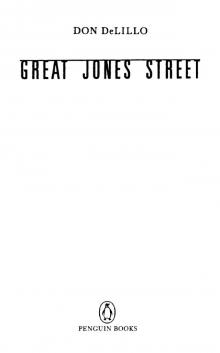 Great Jones Street (Contemporary American Fiction)
Great Jones Street (Contemporary American Fiction)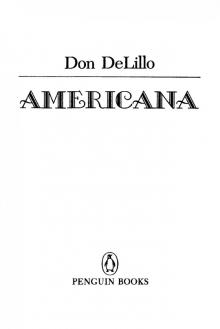 Americana
Americana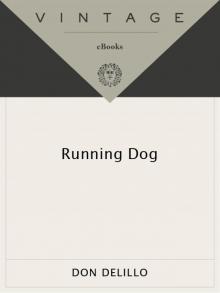 Running Dog
Running Dog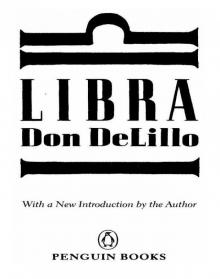 Libra
Libra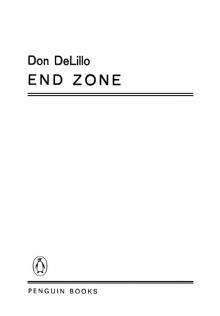 End Zone
End Zone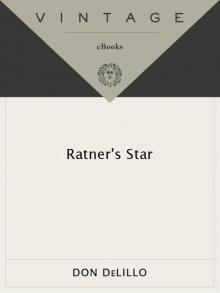 Ratner's Star
Ratner's Star Underworld
Underworld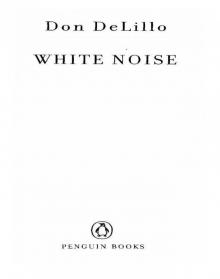 White Noise
White Noise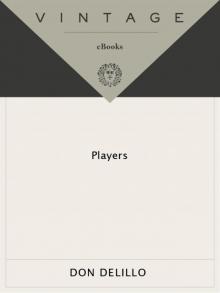 Players
Players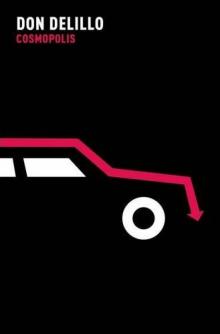 Cosmopolis
Cosmopolis The Silence
The Silence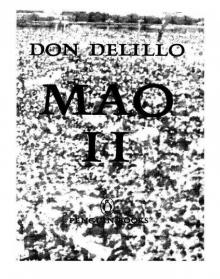 Mao II
Mao II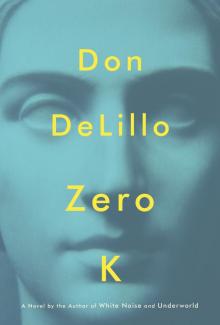 Zero K
Zero K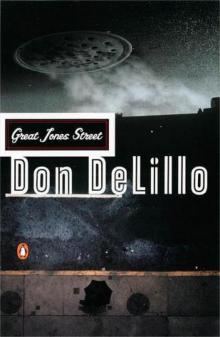 Great Jones Street
Great Jones Street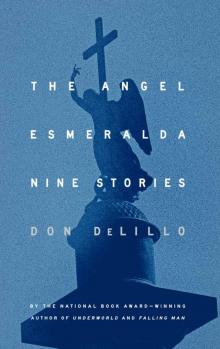 The Angel Esmeralda
The Angel Esmeralda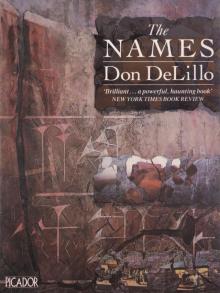 The Names
The Names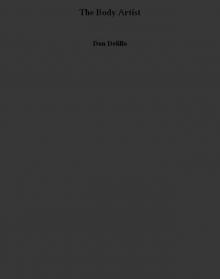 The Body Artist
The Body Artist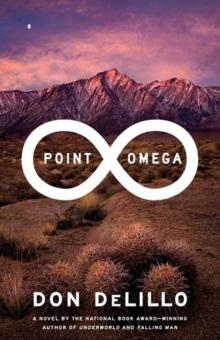 Point Omega
Point Omega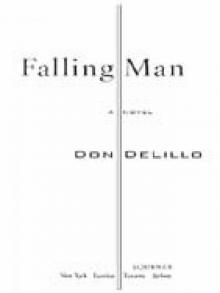 Falling Man
Falling Man